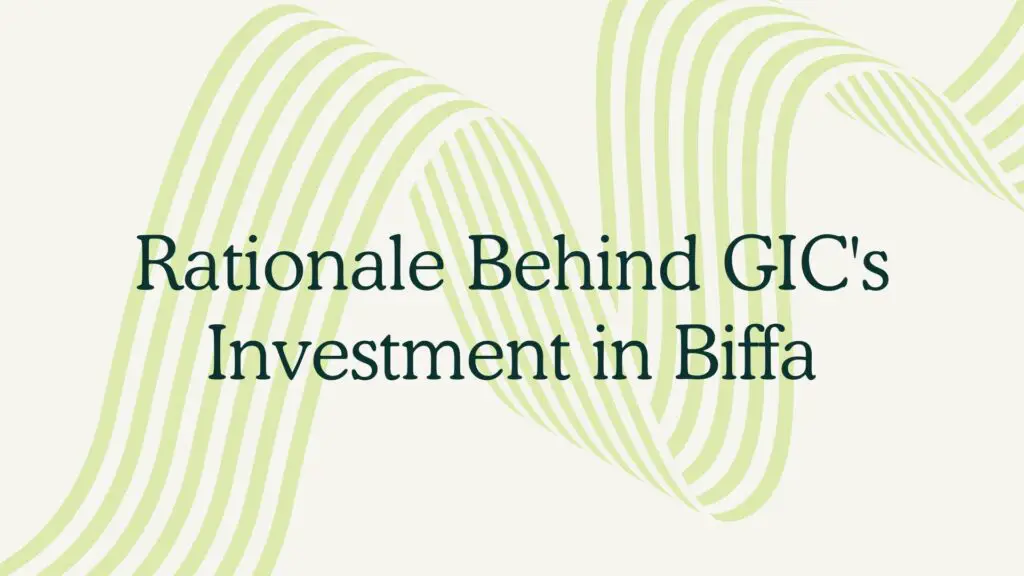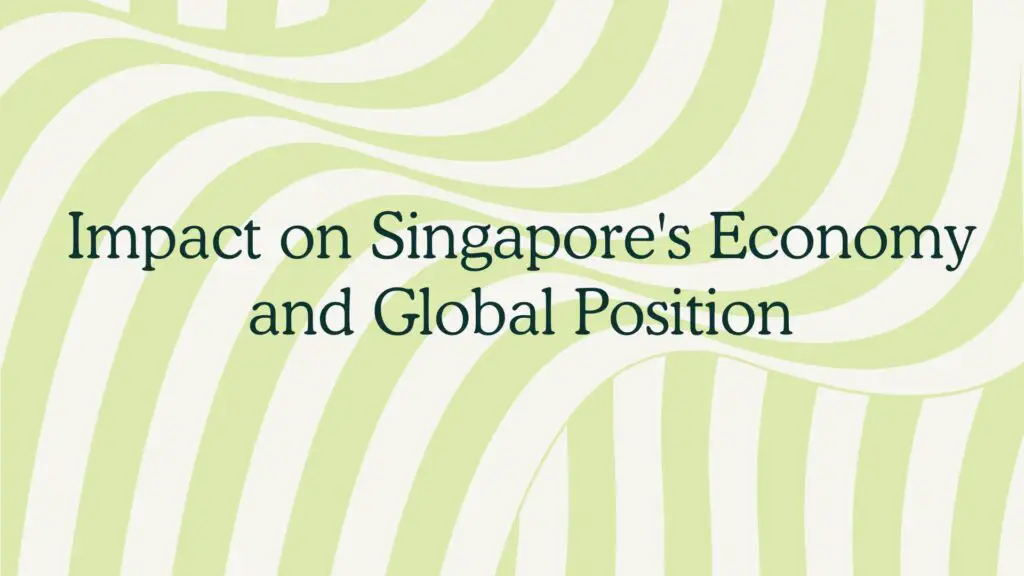Introduction
One of the world’s most prominent sovereign wealth funds is the Government of Singapore Investment Corporation (GIC), which manages more than $700 billion in assets. GIC’s job is to keep and grow Singapore’s savings so the economy can stay stable and grow in the long run. GIC aims to invest in several sectors of worldwide markets to reduce risk and maximize rewards.
It was recently reported that GIC invested in Biffa, a huge trash company in the UK. Biffa knows how to pick up trash, reuse it, and turn it back into energy.
With growing global attention on sustainability and environmental protection, this investment raises the question:
Is GIC’s investment in Biffa an intelligent move for Singapore’s financial future?
Understanding GIC’s Investment Strategy
GIC’s investment philosophy centers on diversification, risk management, and sustainability. By spreading its investments across different sectors and geographies, GIC ensures a balance between growth opportunities and minimizing potential losses. The sovereign wealth fund is known for investing in many fields, such as real estate, technology, infrastructure, healthcare, and, more recently, environmental sustainability.
Key Objectives of GIC’s Strategy:
- Risk Management: GIC carefully evaluates the risks associated with each investment, ensuring that they align with Singapore’s long-term economic goals.
- Long-Term Growth: The focus is on investments that offer steady, sustainable returns over decades.
- Sustainability: With an increasing global focus on environmental, social, and governance (ESG) factors, GIC has shifted toward investments in sectors like clean energy and waste management.
Waste management is becoming essential to the global economy, especially concerning environmental degradation and climate change. GIC’s investment in Biffa fits well with its ESG investment objectives.
Overview of Biffa
Biffa is a well-established waste management company in the United Kingdom. Its operations span waste collection, recycling, treatment, and disposal. Biffa plays a vital role in the UK’s sustainability initiatives by managing a large percentage of the country’s commercial and industrial waste.
Biffa’s services include:
- Waste Collection: Residential and commercial waste pickup.
- Recycling: Converting waste into reusable materials.
- Energy from Waste: Producing energy by converting waste that would otherwise go to landfills.
The UK government focuses more on sustainability, notably in the waste management industry. Companies like Biffa are poised to benefit from this, especially as the country strives to meet its environmental targets. As a leader in the UK waste management industry, Biffa’s reputation has remained strong, making it an attractive target for investors like GIC.
Rationale Behind GIC’s Investment in Biffa
Sustainability is becoming increasingly important worldwide, and it is one of the main reasons GIC invested in Biffa. As more countries start to go green, businesses that offer environmental options like recycling and garbage handling are in high demand.

GIC, paying more attention to ESG, likes Biffa as an investment because of its place in this field.
- Strong Market Position: Due to its dominance in UK waste management, Biffa has considerable room to develop.
- Sustainability Focus: Companies like Biffa are positioned to seize fresh possibilities as environmental rules tighten and public knowledge of sustainability rises.
The investment also fits with GIC’s plan for long-term growth. The waste management industry is essential and always needs workers. Biffa’s growing energy recovery and recycling businesses make it even more likely to increase.
Potential Benefits for Singapore
In the long term, GIC’s Biffa investment might help Singapore in many ways. Investing in a developing sector like waste management would help GIC earn long-term gains for the Singaporean economy.
Here are some of the benefits:
- Long-Term Returns: Rising urbanization, trash creation, and environmental sustainability drive predicted steady growth in the worldwide waste management sector in the following decades. Given Biffa’s prominence in this sector, gains might be excellent.
- Sustainability Leadership: As more buyers focus on ESG factors, GIC’s participation in Biffa makes Singapore an even more prominent leader in sustainable investing.
- Diversification: Investing in trash collection makes GIC’s business less reliant on well-established fields like banking or real estate.
Global Waste Management Industry Outlook
The waste management industry evolves rapidly as governments and corporations prioritize environmental sustainability. The global waste management market is expected to grow, driven by increasing demand for recycling and renewable energy solutions. Countries like the UK are setting ambitious targets to reduce landfill use and increase recycling rates.
- Recycling Demand: As resources become scarcer, the demand for recycling and repurposing materials will continue to rise.
- Energy Recovery: Converting waste into energy is becoming a profitable business—Biffa’s ability to extract energy from waste positions it well for future growth.
Biffa is well-situated to capitalize on these trends, which could provide GIC with solid returns on its investment.
Risks and Challenges of the Investment
Like any investment, GIC’s decision to invest in Biffa comes with certain risks. The waste management industry faces several challenges:
- Regulation: Waste management companies like Biffa are subject to stringent environmental regulations, which could change over time, potentially increasing operational costs.
- Competition: The waste management sector is highly competitive, with new companies entering the market and existing players seeking to expand their market share.
- Market Volatility: Changes in the economic landscape, such as recessions or shifts in commodity prices, could impact Biffa’s profitability.
GIC will need to monitor these risks closely to ensure that its investment remains viable in the long term.
Biffa’s Financial Performance and Outlook
Over the years, Biffa has grown steadily thanks to its solid market position and foray into recycling and energy recovery.
Key performance indicators include:
- Revenue Growth: Biffa has increased its revenue by expanding its recycling and energy recovery services.
- Profitability: Even though the garbage management business needs a lot of cash to run, Biffa has been able to stay profitable by running its business efficiently and making intelligent deals.
- Future Outlook: As the global waste management industry grows, Biffa is well-positioned to capture more market share.
For GIC, this presents an opportunity to benefit from Biffa’s growth trajectory over the coming years.
ESG Considerations in GIC’s Investment
GIC’s investment in Biffa aligns with its increasing focus on environmental, social, and governance (ESG) factors. Waste management directly contributes to environmental sustainability by reducing waste, promoting recycling, and generating clean energy.
- Green Initiatives: Biffa’s commitment to sustainability through waste reduction and energy recovery aligns with GIC’s ESG goals.
- Global Standards: As a sovereign wealth fund, GIC is committed to maintaining high ethical standards in its investments. Investing in Biffa helps GIC contribute to global sustainability goals.
Comparing GIC’s Investment in Biffa with Other Investments
GIC’s investment in Biffa can be compared to its other investments in sustainable infrastructure, utilities, and environmental solutions. GIC has successfully invested in fields aligned with global trends, such as renewable energy and healthcare.
- Infrastructure Investments: GIC has a history of investing in safe, long-term returns on critical services like utilities and roads.
- Sustainable Investments: Sovereign wealth funds emphasize sustainability and ESG factors in their businesses, and this investment follows that trend.
Impact on Singapore’s Economy and Global Position
GIC could make Singapore more well-known as a leader in green investments by putting money into Biffa.

This could have positive implications for Singapore’s economy and global standing:
- Strengthening Global Presence: GIC’s investment in a well-known UK firm may help Singapore’s financial profile be more noticeable worldwide.
- Economic Stability: Successful investments by GIC can help ensure long-term financial stability for Singapore, as the returns contribute to national reserves.
Conclusion: Is GIC’s Investment in Biffa a Smart Move?
In the end, GIC’s decision to invest in Biffa seems bright and fits with its long-term plan of managing risk and being environmentally friendly. The garbage handling business is expected to grow steadily over the next few years, and Biffa’s place as the market leader makes it a good investment for the future. Even though there are threats, like changes in regulations and competition, GIC can handle them well because its business is very diverse.
In general, GIC’s investment in Biffa helps Singapore reach its financial goals and keep its promise to be environmentally friendly. GIC’s move could be an excellent example for savvy investors who want to see long-term growth in essential businesses.
FAQ
- What is GIC’s role in Singapore’s economy?
- GIC is Singapore’s sovereign wealth fund, responsible for managing the country’s reserves and ensuring long-term financial stability through diversified investments.
- Why did GIC invest in Biffa?
- GIC invested in Biffa to capitalize on the growing global demand for waste management solutions and to align with its ESG investment strategy.
- What are the potential risks of this investment?
- Key risks include regulatory changes, competition within the waste management industry, and market volatility.
- How can GIC’s investment in Biffa benefit Singapore?
- The investment could offer long-term returns and enhance Singapore’s reputation as a leader in sustainable investments.
Note: Can a Max Funded IUL Boost Growth for Your Financial Future?

